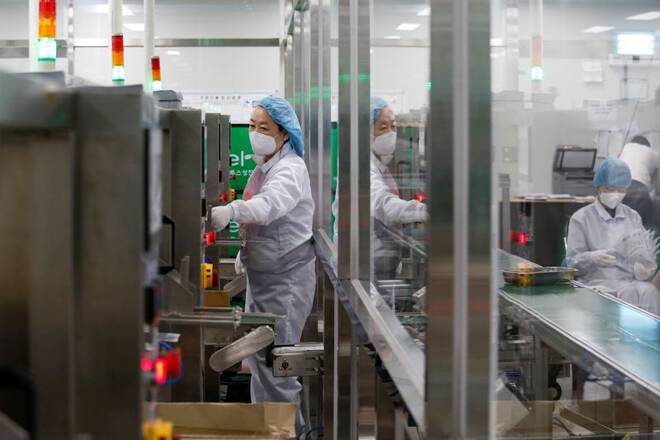Advertisement
Advertisement
South Korea factory activity grows for 14th month but output shrinks, orders slow – PMI
By:
SEOUL (Reuters) - South Korea's factory activity expanded further in November, though output shrank for a second straight month, signalling that Asia's fourth-largest economy is struggling to fully regain momentum in the face of persistent supply chain disruptions.
SEOUL (Reuters) – South Korea’s factory activity expanded further in November, though output shrank for a second straight month, signalling that Asia’s fourth-largest economy is struggling to fully regain momentum in the face of persistent supply chain disruptions.
The IHS Markit purchasing managers’ index (PMI) for November edged up to 50.9 from 50.2 in October, and managed to hold above the 50-mark threshold that indicates expansion in activity, for a 14th straight month.
“Despite the headline PMI rising slightly in November, this masked a second successive contraction in output levels, while new order growth broadly stagnated as supply shortages hit demand,” said Usamah Bhatti, economist at IHS Markit.
Output continued to shrink on shortages of materials, notably in the semiconductors market, while slowing new orders put more strains on firms.
Total new orders and export orders barely grew, as higher demand in key Asian markets such as Japan, mainland China and Taiwan were offset by supply difficulties in the automotive industry.
Adding to the challenge, manufacturers faced more cost burdens, with input prices rising at their quickest pace since the survey began in April 2004, due to higher raw material costs.
That led firms to pass higher costs on to clients, pushing factory gate inflation to a four-month high, and reduce staffing levels for a second straight month.
Firms, however, were optimistic over the coming year that supply chain pressure would ease amid a global recovery in demand, with business confidence improving to a three-month high.
“Confidence was underpinned by hopes that supply chain pressure would ease and the recovery in global demand would accelerate the launch and mass production of new products,” Bhatti said.
The November survey did not reflect the spread of the Omicron coronavirus variant that may add further pressure on the pandemic-disrupted supply chains, with many countries imposing fresh border controls to seal themselves off.
(Reporting by Joori Roh; Editing by Shri Navaratnam)
About the Author
Reuterscontributor
Reuters, the news and media division of Thomson Reuters, is the world’s largest international multimedia news provider reaching more than one billion people every day. Reuters provides trusted business, financial, national, and international news to professionals via Thomson Reuters desktops, the world's media organizations, and directly to consumers at Reuters.com and via Reuters TV. Learn more about Thomson Reuters products:
Did you find this article useful?
Latest news and analysis
Advertisement
